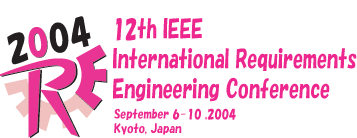

| Keynotes |
Professor Axel van Lamsweerde University of Louvain Goal-Oriented Requirements Engineering: A Roundtrip from Research to Practice The software industry is more than ever facing the challenge of delivering WYGIWYW software (What You Get Is What You Want). A well-structured document specifying adequate, complete, consistent, and precise requirements is a critical prerequisite for such software. Goals have been recognized to act as a driving force for requirements elicitation, elaboration, organization, analysis, negotiation, documentation, and evolution; goals are declarative statements of intent assigned as responsibilities of agents defining the software-to-be and its environment. Growing experience with goal-oriented requirements engineering suggests synergistic links between research in this area and good practice. In this presentation, we describe one journey along this road, from influencing ideas to research results to tool developments to good practice in industrial projects. On the way, we discuss requisites and obstacles to transfer, lessons learnt, and challenges for better RE research and practice in the future.
Axel van Lamsweerde is Full Professor at the
Université catholique de Louvain. He has been
research associate at Philips Research Labs and
professor at the universities of Namur, Brussels,
and Louvain (Belgium). He has also been research
fellow at the University of Oregon and the
Computer Science Laboratory of SRI International
(Menlo Park, CA). He is co-founder of two
software technology transfer centers supported by
the European Union. Since 1990 he has been
instrumental in the development and transfer of
the KAOS goal-oriented requirements engineering
language, method and toolset. He has been
editor-in-chief of the ACM Transactions in
Software Engineering and Methodology (TOSEM),
program chair of major international software
engineering conferences including ESEC'91 and
ICSE'94, and founding member of the IFIP WG2.9
Working Group on Requirements Engineering. He is
an ACM Fellow since 2000.
Professor Nigel Cross Professor of Design Studies
How Creative Design Happens
In designing, there is a complex relationship between requirements and solutions. Creative designing can involve challenging the initial problem requirements; and sometimes the designer°«s job is to generate product ideas for which there is little evidence of prior requirements. This presentation draws upon a variety of research into the processes of design, with an emphasis on understanding how creative design happens. The research has been based primarily in domains of engineering and product design but covers a wide range of examples, from the exotic (Formula One racing cars and high-speed trains) to the mundane (bicycle luggage carriers and litter bins). The research includes interviews with outstanding designers and laboratory studies of expert designers. The presentation will focus on a number of specific instances of creative thinking in design, as reported or observed, and will include video and other evidence and illustrations. Although the examples are quite disparate in contexts, there appear to be commonalities between them, suggesting patterns of cognitive processes which recur in creative designing.
Professor Nigel Cross is a leading international figure in the world of design research. With academic and practical backgrounds in architecture and industrial design, he has conducted research in computer-aided design, design methodology and design education since the nineteen-sixties. His current principal research interest is in design cognition, based on studies of expert and exceptional designers. He has been a member of the academic staff of the UK°«s pioneering, multi-media Open University since 1970, where he has been responsible for, or instrumental in, a wide range of distance-education courses in design and technology. Recent books by Professor Cross include the third edition of his successful textbook on Engineering Design Methods, and he has been a co-editor of books on Research in Design Thinking, Analysing Design Activity and Expertise in Design. Professor Cross is also Editor-in-Chief of the international journal of Design Studies.
|
Ubiquitous/Embedded Requirements for, such as, Digital TV, Mobile Phone,
and Daily Goods
| Last updated: 2004-05-28 |